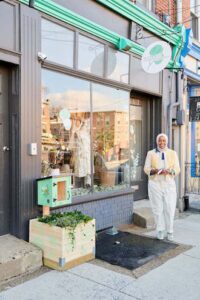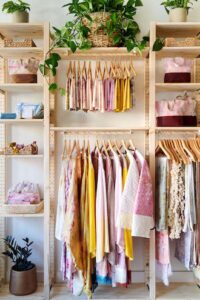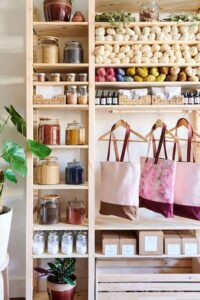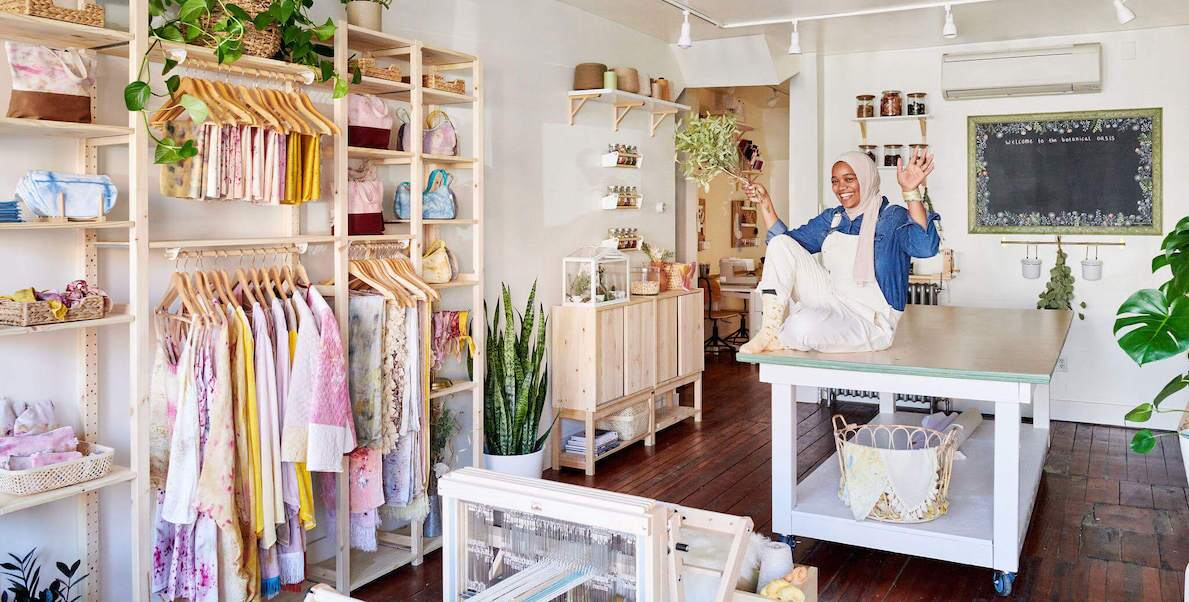Melanie Hasan remembers the first time she saw her natural dyeing workshop help someone who was struggling.
The Philadelphia native was teaching at the Pastorius Community Gardens in East Germantown. Her students foraged for flowers and plants to use in their dyes. As she walked them through the slow process of dyeing fabric, one woman started crying. The woman told Hasan that she had been struggling with her mental health during the pandemic — and that the deliberate process of working with fabric provided an unexpected relief.
“My heart just melted because I couldn’t believe someone trusted me to disclose what they were going through and how my workshop helped them,” Hasan says. “I was like wow, more people need to be able to come to a safe space and create really beautiful things.”
The student’s experience was reflective of Hasan’s own journey. She took up fabric dyeing as a student at the Moore College of Art & Design while recovering from the birth of her son and postpartum depression. To her, natural dyeing felt therapeutic. She wanted to give others that feeling.
That’s why, in February, Hasan opened Modest Transitions, a boutique and studio at 312 E. Girard Avenue in Fishtown. In her warm storefront, she shares the healing, meditative effects of natural fabric dyeing through workshops and promotes sustainable living through eco-friendly, naturally dyed textile products.
Self-taught to sustainable

Growing up, Hasan and her mom sewed and sold crossbody bags to bring in extra money. But it wasn’t a career; she didn’t have formal training. Instead, she worked in nonprofits helping people with behavioral health conditions. Once she had her sons, she became a full-time mom.
Every year, Hasan makes a vision board. In 2019, that board included Moore College of Art & Design. With her husband’s encouragement, she signed up for a one-year adult fashion program. As part of her studies, she took a course on textile sustainability, which exposed her to just how huge the industry’s carbon footprint really is.
The fashion and textile industry is the second biggest polluter, coming, right behind oil. The EPA estimates that 17 million tons of textile waste were generated in 2018. The fashion industry is also responsible for up to one fifth of industrial water pollution, per UN data, much of which comes from synthetic dyes. Several rivers in Asia have become so polluted with the chemicals, dyes, salts and heavy metals used in textile production, that the water is starting to turn black, CNN reported in 2020.
The final for Hasan’s course at Moore required her to use three different sustainable techniques for the collection she was designing. She chose embroidery, block printing and natural dyeing.
She immediately felt drawn to natural dyeing. She loved collecting different materials that may otherwise go to waste, simmering it in water, placing the fabric in the mixture and allowing beautiful designs to emerge. More than that, she loved that these materials — flowers, tree leaves, vegetal skins and other food scraps — could create beautiful patterns without poisoning the environment.
She immediately felt drawn to natural dyeing. She loved collecting different materials that may otherwise go to waste, simmering it in water, placing the fabric in the mixture and allowing beautiful designs to emerge.
She was also drawn to how peaceful the process was. Hasan converted to Islam in 2014 because of the religion’s message of peace. Natural dyeing, with its slow process and emphasis on caring for the environment, felt like an extension of her spiritual beliefs. (The shop’s name also reflects Hasan’s transition to dressing and living more modestly, in accordance with Muslim practice.)
“It was something really peaceful and slow and really intentional about natural dyeing, and I think at the time when I was battling postpartum depression really deeply, it just kind of allowed me to step away and kind of think things through — just enjoy how simple life is,” Hasan says.
The result is always pleasantly surprising. “Dyeing is like getting a birthday gift over and over … You could use the same materials to dye with, but every time you unravel your bundle, it gives a different effect.”
From practice to business
At first, Hasan dyed and made products for herself, but during the pandemic, she created a website to sell her designs online. She also started hosting workshops like the one at the Pastorius Community Gardens in Germantown. Then came Modest Transitions.
Hasan designed the space to reflect the process of natural dying. The right side of the store contains shelves of yarn, books, seeds, dried flowers and other plants that can be used for natural dying. The left features scarves, sweaters, headbands and other textiles Hasan has designed and dyed. In the center of the shop is a large table used for workshops. Eucalyptus leaves, like the ones featured in the shop’s logo, decorate the walls.
“Businesses get really successful and that’s a beautiful thing, but they forget about their community at times. They leave and then our communities are still struggling,” Hasan says.
Hasan divides the year into four three-month terms for the shop’s workshop series and offers between 10 and 30 classes each session, depending on teacher availability and demand. She also offers Empowered Postpartum workshops for new mothers and encourages women to bring their babies to the shop.
Making sure her dyeing is sustainable is key to Hasan’s practice. She uses onions, avocado skins, red cabbage, bananas in her work and grows and forages for many of the other plants used to create dyes. “I’m like a squirrel. I wanted to keep everything because I know the value of it,” she says.
On the textile end, much of the fabric she uses for natural dyeing is cruelty-free peace silk, processed from cocoons after the silkworms metamorphosize into butterflies. Hasan also tries not to let any piece of fabric go to waste. She used scraps from a line of naturally dyed jackets she made last year to make purses and stray pieces of fabric to make wall art.
Beyond the material

Modest Transitions supports other local artists by employing them as workshop leaders and selling their pieces in the store. The shop features a different local maker each month. This month, she’s selling botanical resin necklaces, rings and earrings from Philadelphia-based Escere.
East Passyunk resident Richie Lopez is another Modest Transitions artist. Lopez got into textile arts during the pandemic, when he found the slow pace of weaving and embroidering helped him adjust to the slower pace of life.
He followed Hasan on Instagram and received one of her hand-dyed needle cases as a gift from his partner. When he saw Modest Transitions was looking for workshop leaders, Lopez signed on. He’ll be teaching embroidery and weaving workshops there this summer.
“As makers, we can often do things by ourselves,” Lopez says. “To have a network of people who are also just as excited and interested in making, to connect with, and talk to, and commune together, and create something from nothing. I think that’s really special.”
Building inclusive community

Fostering the type of community Lopez describes was another motivation for starting her business. She needed the support herself. As a Black Muslim woman who wears the hijab, Hasan continuously faces race- and religion-based discrimination. She says people often come into her shop, ask to speak with the owner, and leave when they see her.
She wants her shop to be welcoming to all people from all backgrounds. To her, the naturally dyed scarves she sells in the shop are part of breaking down these barriers. Because what is a hijab, really, but a type of scarf?
“You wear a scarf; he wears a scarf; everyone wears a scarf,” she says. “I just felt really uncomfortable with the stigma surrounding hijab … So, I started naturally dyeing scarves just to bring awareness to the definition of what a scarf is.”
Another way she tries to build community: a range of accessible to splurge-worthy price points. Classes range from $20 to $565 for participants. Her Empowered Postpartum Workshops operate with a pay-what-you-can model. And, if you can’t afford to pay, Modest Transitions offers scholarships funded by donations.
Hasan also places seeds and mini-dye kits in a free little library outside of the shop. She says one of her greatest joys has been seeing the different people who stop by and take a seed packet.
“There are kids, grandmas, grandpas, moms, dads, really big muscular men that I know just came from the job, and I’m like, Whoa, this is really cool,” she says. “I love that people are walking down the street and they’re like, What’s this box? And they read the cards that say, Here this is our free community tool. We just want to give you a good vibe.”
Redefining success in business
Though she declined to share exact figures, Hasan said she’s been able to make Modest Transitions her full-time job. She has hired four staff members, who all make above minimum wage. Profits, while important, are just a part of what makes a successful business, she believes. Creating jobs, providing services for the community, and her own mental health are all part of what Hassan defines as success.
“Businesses get really successful and that’s a beautiful thing, but they forget about their community at times. They leave and then our communities are still struggling,” Hasan says. “My intention with Modest Transitions is just to remain at the community level and be successful, but I’m not here to determine my success by money alone.”
Hasan is currently fundraising to purchase an acre of land on which she’ll grow flowers and other plants for natural dyeing. Sometime next year, she hopes marigolds that bloom on that plot will go into golden-hued spotted patterns on her scarfs.
![]() MORE PHILLY CHANGEMAKERS AND BUSINESSES FOR GOOD
MORE PHILLY CHANGEMAKERS AND BUSINESSES FOR GOOD



